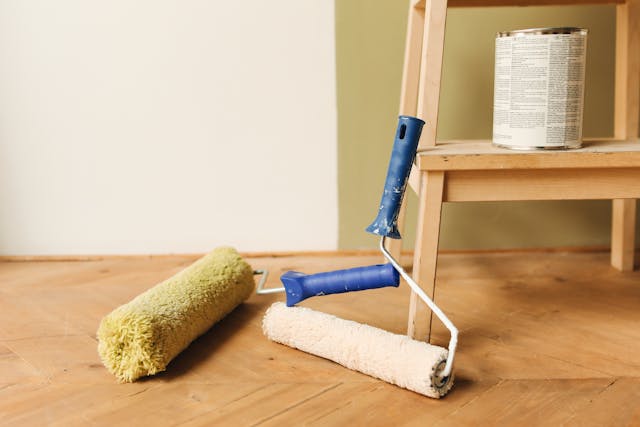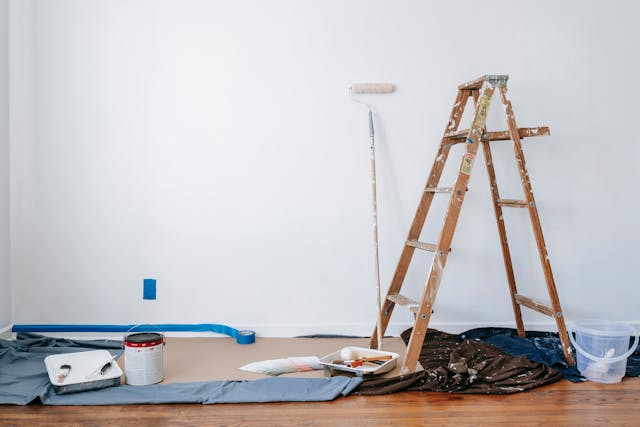Painting your home is one of the most affordable ways to refresh its appearance and add value—but cutting corners on contractor costs can backfire. Many homeowners are tempted to hire low-cost painters to save money upfront, only to face poor workmanship, property damage, or the need for an early repaint.
In this guide, we break down the hidden risks of hiring budget painters and explain why working with licensed painting contractors in Westport, CT is a smarter long-term investment.
Table of Contents
Key Takeaways
✔ Cheap paints fade, chip, and peel quickly, requiring frequent repaints and higher long-term costs.
✔Low-cost contractors often hire painters without proper training, leading to uneven finishes, streaks, and missed spots.
✔ Skipping essential prep work, such as cleaning, sanding, and priming, weakens paint adhesion and reduces durability.
✔Cutting corners can lead to structural issues like peeling, cracking, and mold growth, requiring costly fixes.
✔ Low-quality paint jobs may deteriorate in just 2-3 years, forcing homeowners to repaint frequently and spend more over time.
✔ Hiring uninsured painters can expose homeowners to financial liability for accidents, property damage, and legal claims.
The True Cost of Cheap Paint Jobs
Hiring cheap house painting contractors may seem like a great way to save money upfront, but it often results in higher costs over time. A well-executed paint job requires expertise, high-quality products, and meticulous preparation—all of which budget contractors tend to overlook.
1. Inferior Materials Lead to Faster Wear and Tear
Cheap house painting contractors often cut costs by using low-quality paint and materials, which drastically reduces the longevity of a paint job. While high-quality paints provide superior coverage, resistance to moisture, and long-term durability, budget contractors typically rely on subpar products that cause premature deterioration.
- Use of Low-Quality Paints: Inferior paints tend to fade, chip, and peel within a year or two, leaving walls looking worn out much sooner than expected. A study highlighted by the American Coatings Association emphasizes that the durability of paints and coatings is a key performance characteristic.
- Skipping Primer or Using Cheap Alternatives: Primer is essential for paint adhesion and durability, but low-cost painters either skip this step entirely or use a low-grade primer that fails to bond properly with surfaces.
- Diluted Paint Application: To save on materials, some contractors thin out paint excessively, leading to poor coverage and a need for multiple coats, increasing labor time and future repainting costs.
2.Inexperienced or Unskilled Labor
Many low-cost house painting contractors hire inexperienced workers who lack the necessary skills and expertise to deliver a flawless, professional finish. Their lack of training often leads to visible imperfections that require costly corrections.
- Uneven Brush Strokes and Streaks: Improper painting techniques result in streaky, patchy, or inconsistent coverage, making walls appear unfinished.
- Missed Spots and Uneven Color Application: Inexperienced painters often apply uneven coats, leading to discoloration, splotches, and unfinished sections.
- Drips, Splatters, and Paint on Unintended Surfaces: Careless painters frequently leave behind paint drips, splatters, and uneven edges, damaging trim, flooring, and adjacent surfaces.
3. Lack of Proper Surface Preparation
A long-lasting paint job requires thorough preparation, which is often neglected by budget contractors. Without proper prep work, even the highest-quality paint won’t adhere properly, leading to premature failure.
- Failure to Clean Surfaces: Dirt, grease, and mold create a weak foundation for paint, leading to peeling, cracking, and uneven application. Professional painters thoroughly clean walls before applying paint.
- Skipping Patching and Sanding: Walls often contain holes, dents, and imperfections that require patching and sanding. Cheap contractors skip this step, resulting in a rough and unpolished finish.
- Neglecting Primer Application: Primer is crucial for paint adhesion and long-term durability, yet low-cost painters either skip this step or use a low-quality substitute.
3 Hidden Costs of Hiring a Cheap Contractor
Choosing low-cost house painting contractors might seem like an easy way to save money, but the reality is far from it. Below, we’ll explore the hidden financial risks of hiring unlicensed or inexperienced painters and why working with licensed painting contractors is a smarter long-term investment.
1. Additional Repairs Due to Poor Workmanship
When cheap painting contractors cut corners, the structural integrity of your walls can suffer, leading to expensive repairs that could have been avoided. Poor workmanship often results in surface damage, moisture issues, and frequent maintenance needs.
- Improper Painting Techniques Lead to Structural Issues: Unskilled painters often apply paint over uncleaned or damp surfaces, trapping moisture underneath. This can cause peeling, cracking, and even mold growth, requiring professional repairs.
- Common Painting Defects That Require Fixing Later: Low-quality painters frequently leave behind visible roller marks, streaks, and uneven color application. These defects not only reduce your home’s aesthetic appeal but also necessitate a costly repaint.
- Neglecting Wall Repairs Before Painting: A professional job includes house painting and drywall repair, ensuring smooth, even surfaces before applying paint. Cheap contractors often skip this crucial step, leaving holes, dents, and imperfections visible through the paint.
2. The Cost of a Premature Repaint
A quality paint job should last 7-10 years, but when using low-grade materials and improper techniques, cheap contractors deliver results that start deteriorating within just a couple of years. The need for frequent repaints significantly increases long-term costs.
- Cheap Paint Jobs Don’t Last: Low-cost painters often skip primer, dilute paint, or use substandard products, leading to peeling, bubbling, and fading within months.
- Frequent Repaints vs. Professional Longevity: A cheap paint job might require a repaint every 2-3 years, whereas an investment in experienced painting contractors ensures a durable, long-lasting finish.
- Comparing Long-Term Costs: Homeowners often assume they’re saving money by hiring cheap house painting contractors, but the cost of repainting every few years quickly adds up. A high-quality paint job done right the first time saves both time and money in the long run.
3. Potential Property Damage Risks
Beyond the visual and structural consequences, hiring an unlicensed or uninsured contractor exposes homeowners to legal and financial risks. Cheap contractors often lack liability coverage, leaving you responsible for any damage or injuries that occur on-site.
- Lack of Liability Insurance Puts You at Risk: Reputable licensed painting contractors carry insurance to cover accidents, property damage, and worker injuries. Cheap painters without insurance leave you financially liable for any mishaps.
- Accidents Can Lead to Unexpected Costs: Inexperienced painters may spill paint on floors, furniture, or landscaping, leading to costly cleanups or replacements. They can also damage fixtures, doors, or trim, increasing expenses beyond just repainting.
- Legal and Financial Risks of Uninsured Workers: If an uninsured worker is injured on your property, you could be held legally responsible for medical bills and lost wages. Hiring wall painting professionals with proper insurance protects you from unexpected legal troubles.
4 Signs You’re Hiring a Cheap (and Risky) Painting Contractor
Choosing the wrong house painting contractors can lead to poor-quality work, unexpected costs, and even legal issues. To avoid costly mistakes, watch for these warning signs when hiring a painting service.
1.Unrealistically Low Estimates
If a quote is significantly lower than others, the contractor may be cutting corners. A fair, transparent estimate includes:
- Labor Costs: Cheap contractors often hire unskilled or inexperienced painters who lack the precision and expertise needed for a professional job. This can lead to uneven coats, streaks, and missed spots that require costly touch-ups later. On average, homeowners spend around $1,983 for a professional house painting project.
- Material Quality: Some contractors use low-quality paint brands that fade, peel, or require multiple coats to achieve proper coverage. High-quality, durable paints offer better adhesion, resistance to wear, and a longer-lasting finish.
- Surface Preparation Work: Skipping crucial prep work, such as sanding, priming, and patching, can cause paint to chip and bubble within months. Experienced painting contractors always prep surfaces properly to ensure a smooth and long-lasting finish.
2. Lack of Proper Licensing and Insurance
A professional painting contractor should have the necessary licenses and insurance coverage to protect both you and your workers. Beware of contractors who cannot provide:
- State Licensing: Many states require contractors to be licensed, ensuring they meet industry standards and legal requirements. Unlicensed painters often lack proper training and may not follow safety regulations.
- Liability Insurance: If a contractor spills paint on your hardwood floors, furniture, or landscaping, liability insurance ensures you won’t be financially responsible for the damage. Cheap contractors often lack this coverage, leaving homeowners vulnerable.
- Workers’ Compensation Insurance: If a painter falls off a ladder or gets injured on your property, workers’ comp insurance prevents you from being held liable for medical expenses or legal claims. Many low-cost painters skip this coverage to cut costs, putting homeowners at risk.
3. No Written Contracts or Guarantees
A reputable painting contractor will always provide a clear, written agreement that outlines every aspect of the project. If a contractor refuses to give a contract, that’s a major warning sign. A proper contract should cover:
- Scope of Work: Lists all painting tasks, preparation work, and any included repairs such as house painting and drywall repair to prevent surprises later.
- Materials and Brands: Specifies the exact paint brands, primers, and finishes to ensure high-quality materials are used. Cheap painters often use watered-down paint or change brands without notice.
- Estimated Completion Time: A reliable contractor provides a realistic project timeline. Cheap contractors often underestimate the time needed, leading to rushed work or missed deadlines.
- Warranty Information: A professional contractor offers a warranty on their work, ensuring peeling, chipping, or fading won’t occur within an unreasonable timeframe. Contractors who don’t offer guarantees likely don’t stand behind their work.
4. Poor Reviews or No Portfolio of Past Work
The best way to gauge a contractor’s reliability is by looking at their past work and customer feedback. Before hiring, always check:
- Online Reviews: Read Google, Yelp, and BBB reviews to identify consistent customer complaints such as missed deadlines, unprofessional behavior, or sloppy work. Cheap contractors often have a pattern of dissatisfied customers.
- Before-and-After Project Photos: Professional wall painting professionals take pride in their work and showcase high-quality transformations. If a contractor can’t provide project photos, it may indicate a lack of experience or poor results.
- References from Past Clients: Always ask for direct customer references. If a contractor hesitates or refuses, it’s a sign that past customers may not have been satisfied with their work.
What to Look for in a Reliable Painting Contractor
Hiring the right house painting contractors in Westport, CT, ensures quality, durability, and a hassle-free experience. Here’s what to look for when choosing a trustworthy professional.
1. Certifications, Licensing, and Insurance
A reputable contractor should be fully licensed and insured to protect both you and your home. Always verify:
- Licensed Painting Contractors: Confirm that the contractor holds all necessary state and local licenses, ensuring they meet industry standards and legal requirements.
- General Liability Insurance: This protects you from financial loss if the contractor damages your home, furniture, or landscaping during the project.
- Workers’ Compensation Insurance: If a worker gets injured on your property, this coverage ensures you won’t be held responsible for medical bills or legal claims.
- Industry Certifications: Look for contractors with certifications from reputable organizations, proving they follow best practices and quality standards.
2. Transparent Pricing and Detailed Estimates
A professional wall painting professional should provide a clear, itemized estimate upfront to help you understand exactly what you’re paying for. A detailed estimate should include:
- Labor Costs: Ensures you’re paying for skilled and experienced painting contractors, not cut-rate labor that leads to poor results.
- Material Costs: Specifies the brand and type of paint, primers, and protective coatings to guarantee high-quality, long-lasting results.
- Surface Preparation Work: Outlines house painting and drywall repair, sanding, priming, and caulking needed to ensure a flawless finish.
- Project Timeline: Provides an estimated start and completion date, ensuring the project stays on schedule without unnecessary delays.
3. Experience and Expertise
Hiring experienced painting contractors ensures precision, efficiency, and long-lasting results. Before making a decision, look for:
- A Proven Track Record: Contractors with years of experience have the expertise to handle various surfaces, textures, and custom finishes.
- Before-and-After Project Photos: A skilled contractor will have a portfolio showcasing previous work, demonstrating attention to detail and consistency.
- Customer Reviews and References: Check online reviews on Google, Yelp, and BBB, and ask for direct client references to verify past customer satisfaction.
- Specialized Knowledge: Some contractors specialize in house painting and drywall repair, ensuring they can fix imperfections before painting for a smoother finish.
4. High-Quality Materials and Techniques
A reliable contractor will never cut corners on materials or preparation. They will use:
- Premium-Grade Paints: High-quality paints provide better coverage, fade resistance, and durability, reducing the need for frequent repainting.
- Proper Surface Preparation: The best painters clean, sand, prime, and repair surfaces before applying paint to ensure a smooth, long-lasting finish.
- Protective Coatings for Durability: A professional wall painting professional will apply sealants and weather-resistant coatings to protect against moisture, stains, and UV damage.
- Advanced Painting Techniques: Experienced contractors use spraying, rolling, and brushwork techniques suited to different surfaces, ensuring a flawless application.

Frequently Asked Questions (FAQ)
How can I tell if a painting contractor is cutting corners?
Signs of poor workmanship include rushed prep work, low-quality materials, and a lack of a written contract. House painting and drywall repair should always be included in the preparation process to ensure a smooth, long-lasting finish. Experienced painting contractors take the time to sand, prime, and properly seal surfaces.
What should a professional painting estimate include?
A detailed estimate from licensed painting contractors should outline labor costs, material expenses, prep work, and any potential extra charges. It should also include the type of paint being used, a project timeline, and any warranty offered on workmanship. Wall painting professionals provide itemized quotes to ensure transparency.
How long should a high-quality paint job last?
A professionally painted exterior typically lasts 7 to 10 years, while interior paint can last 5 to 7 years, depending on maintenance and wear. High-traffic areas or surfaces exposed to extreme weather may need touch-ups sooner. Experienced painting contractors use premium materials and proper techniques to maximize durability.
Why do professional painters charge more than budget contractors?
House painting contractors invest in premium paints, skilled labor, and thorough prep work, all of which contribute to a higher upfront cost but a longer-lasting result. Licensed painting contractors also provide warranties, ensuring that their work meets high-quality standards and
doesn’t require frequent touch-ups.
Can a cheap paint job damage my home?
Yes, poor-quality paint and improper application can lead to peeling, cracking, and moisture damage. House painting and drywall repair should always be done before applying paint to prevent structural issues. Cheap contractors may skip essential steps, resulting in mold growth, water damage, or costly repairs down the line.
Don’t Let a Cheap Paint Job Cost You More — Choose Quality That Lasts!
If you want results that last, don’t settle for less. At Custom Colonial Painting, we bring decades of experience, expert craftsmanship, and premium materials to every job across Westport, CT.
Whether you need interior painting, exterior updates, or drywall repair, we ensure flawless finishes and reliable service—every time.
Contact Custom Colonial Painting today for a free, detailed estimate and see why homeowners across Connecticut trust us to protect and beautify their homes.



